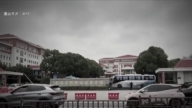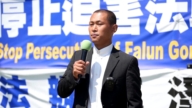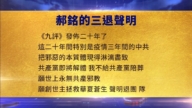【新唐人2015年01月02日讯】来自北京大学、清华大学、中国社科院的十名社会学学者,日前联名上书中共总书记习近平,呼吁当局关注前不久发生在山西太原的“女农民工讨薪反遭警察打死”事件,并指出由于大陆《劳动合同法》形同虚设,农民工的权益无法得到应有的保障,这类悲剧才会一再上演。
2014年年终岁末,一则“警察打死讨薪女农民工,死亡后仍遭脚踩头发”的图片消息在网路曝光后,引发了极大民愤。
据大陆媒体报导,在山西太原市打工的河南省郸城县农民工王奎林一家,因年底已到,但工资仍被拖欠,准备直接找包工头讨要,被保安阻拦。争执中警察到场,将王奎琳母亲周秀云毒打致死,父亲王有志被打断四条肋骨。而涉案民警王某仅被当局以涉嫌滥用职权罪逮捕。
中国劳动关系学院教授王江松:“这些警察、公务人员只对某些跟他们利益直接相关的,给他们利益的那些人负责。比如说黑心的老板啊,这种利益输送、利益勾结太密切了。我们普通老百姓、民工跟这些警察没有利益输送。现在为了这个‘利’字,为了利益,什么法律、良知全都抛弃了。”
随着事件的发展,民间在要求严惩打人警察的同时,呼吁当局重视农民工权益的声音也越来越响。
马晓明:“它看起来是警察和上访者、讨薪人的矛盾,当然警察的粗暴也是令人发指的,但是更深一层,就是这么大政府遇到欠薪的问题,不好好的解决,推过来推过去,拖延推诿形成了矛盾的激化。”
12月29号,清华教授沈原、郭于华、北大教授佟新、中国社科院研究员沈红等十名社会学学者,针对上述事件联名向当局发出公开信。
参与联署的学者们认为,警察打死农民工事件,不仅表现了警察的违法执法,也反映了大陆多达4000万建筑业农民工签订劳动合同难的问题,以及由此产生的长期存在的欠薪、讨薪难、没有社保、缺乏劳动安全保障、罹患职业病和遭遇工伤后得不到合理赔偿等一系列严重问题。
学者们表示,他们自2007年发起“关注新生代农民工计划”,对4000万建筑业农民工的劳动状况进行了调查研究,发现目前大陆存在大量侵害农民工权益的事件。
学者们指出,第一、劳动部门执法不力,使得《劳动合同法》形同虚设。在调查的138起集体讨薪案例中,没有劳动合同的比例高达95%。
第二、建筑业农民工的工资严重地拖欠,工伤和职业病得不到赔偿。据2013年的调研显示,依照劳动法规定按月结清工资的建筑工人,只占19.9%,四成的工人表示过去一年的工钱没有结清,甚至有公司10.5%的工人表示“全部工资款仍被拖欠”。
第三,《建筑法》明文禁止建筑公司违法转包、分包建筑工程的行为,现实中却屡禁不止,成为欠薪的重要祸首。
前陕西电视台记者马晓明:“劳工的状况就很悲惨,除了像欠薪,现在还有超时、超额的劳动,像大陆现在,劳工频频因为劳累死亡,因为精神不堪单调的和非常繁重的劳动,有跳楼的、自杀的等等。”
信中,学者们还向当局提出了问责劳动部门,真正落实《劳动合同》、推动组建工会,发挥人民监督的力量等建议。
对此,民间学者以中共“反贪”为例,对《劳动法》的实施提出了进一步的看法。
王江松:“现在光反贪是不管用的,贪官是层出不穷的,关键是要铲除贪腐的土壤,那就是给老百姓权力。即使制定了很漂亮的法律,中国的法律有很多漂亮条款,像‘保护人民生命财产安全’,但关键是谁来执法?谁来督法?”
前陕西电视台记者马晓明则提出,中国的工会,都是由党和政府机构任命和设立的,而不是工人自己选举产生的。除非中国的工人能建立真正属于自己的、独立的工会,否则很难维护自身的合法权益。
采访/田净 编辑/张天宇 后制/萧宇
Academics Call for Implementing Labor Rights
Ten sociologists from Peking University, Tsinghua University,
Chinese Academy of Social Sciences jointly addressed a letter
to Communist China leader Xi Jinping regarding a migrant
worker killed by police violence.
The police of Shanxi Province killed a female migrant worker
who asked for wage arrears.
It shows that migrant workers’ rights have been ignored
and labor contract law has been ineffective.
The tragedy will only be staged again.
An outrageous news item erupted at the end of 2014.
An online post showed a female migrant worker was beaten
to death by police when asking for arrears in wages.
The police even stepped on her hair after she was dead.
Chinese media reported, Wang Kuilin and his family came
from Henan Province.
Being migrant workers in Taiyuan, Shanxi, they were ready
to demand the arrears in wages from the contractor,
but were stopped by security.
During the dispute, the police arrived.
Wang’s mother, Zhou Xiuyun was beaten to death;
his father, Wang Youzhi had four broken ribs.
The policeman surnamed Wong was arrested
on suspicion of the crime of abuse of power, only.
China Institute of Industrial Relations, Professor
Wang Jiangsong: “These police officers and civil servants
only work for those who directly relay interests to them,
such as the sinister boss who has very close interest transfer
and collusion with them.
The ordinary people and migrant workers don’t transfer
any benefit to the police.
Thus the police completely abandon the law or
conscience simply for the benefit."
While some people demand stern punishment of the police
who committed the violence,
more people are addressing the protection of migrant workers’
rights and benefits.
Ma Xiaoming: “It looks like a conflict between the police
and the petitioners or the people who demand their wages.
Of course the police brutality is outrageous.
But in fact, the government has failed to resolve
the issue of wage arrears.
A series of delays and ignorance have only
intensified the conflict."
Ten social science scholars jointly issued an open letter
regarding the matter on Dec. 29,
including Shen Yuan and Guo Yuhua from Tsinghua University,
Tong Xin from Peking University,
and Shen Hong from Chinese Academy of Social Sciences.
They believe the police killing of a migrant worker has shown
the police violate the law in law enforcement,
and reflect the difficulty in promoting labor contracts
for 40 million Chinese migrant workers.
Workers have thus suffered from a series of problems
such as the everlasting arrears in wages, lack of social security
and occupational safety protection, and no compensation
for occupational diseases and injuries.
According to the research of 40 million migrant workers
launched in 2007,
academics identified mainland workers’ rights and benefits
have been largely violated.
The research found: First, Labor Contract Law has
existed in name only since the labor department ignores
law enforcement.
In 138 cases of mass incidents with workers demanding
wage arrears, investigation found 95% of them
hadn’t signed a labor contract.
Second, wage arrears are serious in the construction industry,
migrant workers’ injuries and occupational diseases are not
compensatory.
According to a 2013 survey, only 19.9% of construction
workers received monthly wages according to labor law.
40% of them still had wages unpaid from a year ago.
There are certain companies still owing 10.5% of their workers
their total wage.
Third, the Construction Law expressly prohibits the illegal
subcontracting of construction companies;
but, in reality, the subcontracting was never stopped
and became the main culprit in wage arrears.
Former Shaanxi TV reporter Ma Xiaoming: “The situation
for labor workers is very miserable.
Other than wage arrears, there is also overtime.
Excessive labor has exhausted and killed many
in China today.
Many commit suicide due to mental suffering
and heavy labor."
In the letter, the scholars suggest holding the labor department
accountable in implementation of labor contracts,
establishing unions, and allowing civilian supervision.
In this regard, there are further views on the implementation
of labor law, with the anti-corruption campaign as an example.
Wang Jiangsong: “Fighting against corruption is useless
because there are endless corrupt officials.
The key is to eradicate the soil that breeds the corruption.
That is to empower the people.
Law provision such as the Chinese law, ‘to protect people’s
lives and property’, sounds pretty,
but the key is who is going to do the law enforcement?
Who will supervise the law enforcement?"
Ma Xiaoming criticizes that China’s unions are appointed
by the party and government.
Only when Chinese workers are allowed to form their own
independent unions will the workers be able to safeguard
their own legitimate rights and interests.
Interview/TianJing Edit/Zhang Tianyu Post-Production/XiaoYu




























